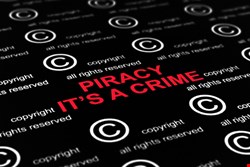
Not a day goes by when I’m not tempted to buy a Rolex watch for $79 or a set of Bose headphones for $49. Knock-off bogus products make the world go round to the tune of $135 billion – that’s the amount of sales attributed to counterfeit goods sold online. How would you feel if pirates stole your IP and re-sold it for profit?
Thanks to Wikipedia’s blackout and the efforts of Google and Facebook in generating millions of protest emails in opposition to the controversial legislation known as SOPA and PIPA, the bills have been put on the back burner for revision. As unpopular as the bills were, the problem of stolen goods continues to be pervasive.
Advocacy groups like the Coalition Against Counterfeiting and Piracy say that IP-intensive industries most at risk from piracy of their goods “employ more than 19 million Americans, provide 60% of US exports, and drive our economic growth to the tune of $7.7 trillion in gross output…. Rogue sites have no place in a legitimate online market.”
Findings published in 2007 by the 30-member nation economic forum OECD claim that losses from the international trade in counterfeit and pirated products totaled $200 billion. What’s shocking is that this total does not include pirated products distributed over the Internet. “If these items were added, the total magnitude of counterfeiting and piracy worldwide could well be several hundred billion dollars more”, the OECD noted.
Let’s be clear on one provision: the bills never aimed to shut down a site because of links it makes to piracy sites that infringe on copyrights. The bill would simply ask the site to remove the link to the rogue site that a court had found to be peddling contraband.
The Business Software Alliance – an anti-piracy group supported by the likes of Apple, Dell and Microsoft – supported SOPA but stressed in a November blog how “much work remains ahead for the Committee.” Last year the organization filed an eye-opening study on the problem, reporting how “emerging economies have become the driving force behind PC software piracy, which leapt 14 percent globally in 2010 to $59 billion.”
The issue ultimately boils down to trust. Whatever happened to our trust in a government designed to protect its people?
When it comes to electronic communications and e-documents, digital data can be so easily tampered without the owner having a clue. How do you trust data that moves around the world at a click? For every digital item, one should ask, is it real, or is it Memorex? Where do you apply authenticity and integrity when data is stored on disk, moves across a network, or sits in the cloud? One way is the use of keyless signatures that rely only on mathematics to ensure trust for digital assets. Imagine a tag, or signature that never expires and does not depend on keys, secrets, certificates, or third parties. This signature can prove the authenticity, integrity, and even source and residency of the signed digital asset.
Major media is reporting how the bill is essentially a conflict between old and new media. It’s actually a conflict between those who have the most the loose. Nobody wants government to control where they can or cannot go online, but all sides suffer from the consequences. It’s nice to watch $100 million Hollywood movies for free, but a lot of real jobs are at stake.
How many jobs? In May 2011, the US Trade Commission put out a press release that stated, “U.S. firms in the IP-intensive economy reported that an improvement in China's IPR protection and enforcement to levels comparable to the United States' would likely increase employment in their U.S. operations by approximately 923,000 jobs.”
The public’s initial response to laws perceived to even hint at Internet regulation will be received negatively. Many protests to the bills were irresponsible and opposed these piracy rules based on exaggerated claims behind their enforcement. We should break our habit of seeing the US government as the bad guys.
If the feds can’t win enough votes for passage of this bill, then our best interests must be protected by advances in trust technology.
Mike Gault is CEO of GuardTime. He started his career as a scientist holding a post-doctoral fellowship at the European Commission conducting research in Japan on the mathematical modeling of quantum effect devices. He then had a 10-year career in the mathematical modeling and trading of financial derivatives, initially at Credit Suisse Financial Products, then as managing director and co-head of trading at Barclays Capital Japan. Gault is co-founder and director of Umami Sustainable Seafood, the largest tuna aquaculture company in the world. He received a PhD in electronic engineering from the University of Wales. You can reach him via email Mike.Gault@guardtime.com.